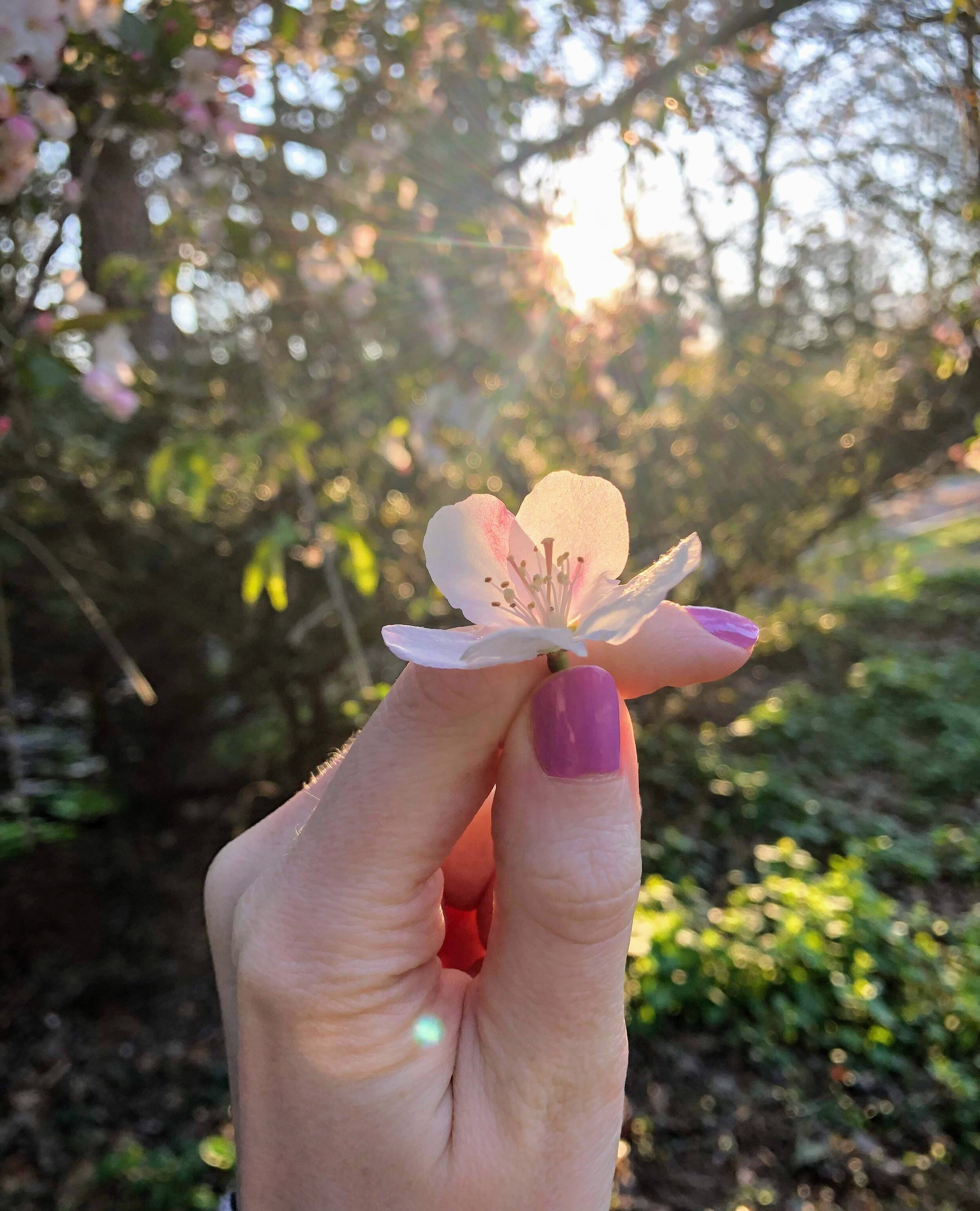Chronic Illness Life: Lessons from Four Years

Hi friends!
May is Lyme Disease Awareness Month and the anniversary (if you will) of my personal Lyme disease diagnosis and treatment journey. Instead of rattling off another FAQ or basic overview of Lyme disease and it’s many fun symptoms and challenges, which you can read here, I thought I would do something a little more personal.
Two years ago I wrote a post on the biggest lessons I learned from living with Lyme disease up until that point, which happened to be two years in. Now that I am four years in I decided to write an updated version. Here goes!
1.) Prioritize Joy
I used to think joy was optional—icing on the cake perhaps. Pleasant, but not a priority. I am now convinced that joy should be pursued as much as any medicine.
When I say pursuing joy, I don’t mean chasing chasing whatever I want whenever I want it. I mean pursuing that which makes life worth living. For me this means pursuing a deeper understanding of who I am in Christ—how loved, cherished, valuable and worthwhile I am—and reminding myself of the purpose and mission I have. This means prioritizing the activities and outlets that stir up my hunger for life—cultivating and fine-tuning my natural abilities and skills, serving others with my unique gifts, and making time for the hobbies that most energize me. Oh and most importantly, finding ways to laugh!
We don’t know what tomorrow may bring or when certain opportunities could be taken from us. I believe it honors God and energizes our souls when we joyfully explore and appreciate the people, time and chances we have been given. This can certainly lend itself to bigger pursuits but often it can be done in the small, seemingly insignificant things—listening to a beautiful song, reading a compelling story, an engaging conversation with a friend, sending a letter to someone struggling, watching an epic movie or enjoying cool breeze in an evening drive. Often those small activities can keep the sparks of life simmering when darkness lingers.
2.) Let Go of Comparison
I believe the temptation to compare our lives to others follows us around through every stage of life. Even if we aren’t comparing to others, we can still compare ourselves against our own expectations and standards. Sometimes I want to measure my goals or progress against what I used to be able to do rather than what a person with my health struggles should realistically be able to handle. I have learned that such comparison is a recipe for chronic discouragement. At times I can also compare myself to others with similar conditions. I may see someone who managed to start a business or nonprofit or ministry while being chronically ill and then feel worse about myself. I have learned that it isn’t wise to compare myself to others in similar places because I am an individual with my own unique challenges, circumstances and wirings and such comparisons don’t take those factors into account.
Now when I look at those who have found successful ways to redeem their illnesses, I choose to become inspired and encouraged that I can still do great things even if I don’t get better rather than discouraged or ashamed.
3.) Redefine Happiness
This is similar to my first point, but the emphasis here is on perspective. I believe a crucial element in coping with a long-term illness is to intentionally redefine what happiness looks like. I have decided (and continually must decide) that a happy life isn’t conditioned on smooth circumstances, full health, a flourishing career, or even attaining certain life statuses and dreams—but on having a vibrant inner life, a deeper purpose to live for and meaningful relationships. These gifts, like health, success, fulfilling endeavors and certain life statuses are wonderful things, but they are all temporary and can be taken away at any time. I am constantly reminded to use eyes of faith and remember how fleeting and uncertain this life is. Happiness for me means believing that this life is not all there is and that one day there will be no more tears, sickness or mourning, pain or death and that Christ will indeed make all things new (Revelation 21:4).
4.) Learn to Accept and Embrace Discomfort
Physical discomfort—fatigue, malaise, pain, weakness—is just not fun. My instinctual response is to try and get rid of or at least minimize it as much and as quickly as possible. There are some days where it lets up, or I can sufficiently minimize it or distract myself, but there are days where I honestly cannot. I have learned that on those days, where the symptoms aren’t letting up no matter how many things I try that usually work, I have two options: 1.) grow cranky, frustrated and increasingly miserable until said symptoms grow even worse and I exhaust myself into submission; 2.) accept the discomfort as part of life, make the necessary adjustments to deal with it and try to make the best of the time until it passes.
Too many times I have picked option one and regretted it. But I am learning that it is much healthier to pick option two. I am learning to see that pain is an inevitable part of life in this fallen world and that kicking and screaming against every sign of it tends to make everything more overwhelming. I am learning (very, very slowly) to embrace physical discomfort that may come and to let it stretch me. I don’t have to enjoy it or be passive about it, but when I am able to accept it as part of life right now, I can better withstand it and grow stronger. Part of this acceptance is also learning not to berate myself when symptoms keep me from accomplishing or participating in certain goals or plans for the day.
5.) Process Emotions
Walking through years of a difficult illness that affects every single part of my life each day produces a fair share of negative and painful emotions. It has been absolutely critical therefore to lean how to best cope and process through them.
If I’m having a bad day and struggling with sorrow, anger, fear, discouragement or embarrassment, instead of immediately seeking to deny, repress or numb these feelings, I let myself feel them. That sometimes means a good cry session or even screaming out loud if I need to! It means admitting to myself, or maybe a close friend, what I am truly feeling. The goal is not to feed into these negative emotions, but to let my body release them so I am able to begin processing and move forward.
After releasing the emotion, what most helps me is either processing out loud with a close friend or journaling about it. It’s absolutely amazing how getting something out—either through sharing verbally or through writing—can lighten the burden of a particular struggle. There is something very healing and powerful of putting our vague emotions into words that enables us to discern patterns and diagnose triggers. Bottled up emotions intensify until they explode, but releasing them into words helps me no longer feel as controlled by them.
7.) Accept Help
I am still learning how important it is to accept help. Sometimes that means accepting emotional support, financial support, assistance with practical matters or even seeking mental health support through counseling. Being sick or having extra needs isn’t a crime and many people genuinely do want to help in some way.
9.) Strive for Routine
I talked about this in more depth in another post, but striving for a semblance of routine has been extremely helpful for me. I grant that there are times where the routine may need to be altered or adjusted depending on symptoms and life factors, but routine is hugely helpful. What helps me most of all is being as consistent as possible with bedtimes and wake up times. If nothing else could be consistent or scheduled, I would at least make every effort to keep a consistent sleep schedule.
10.) Live for Today
I truly apologize for the cliche subheading. After four years and counting of this difficult, life-altering illness, I feel more strongly about this point than ever before. Many people in my life, myself included at times, will say things like, “when you are feeling better, then we can do this or that thing,” or “don’t worry about this or that until you are better,” etc. It makes a lot of sense to say that as there are truly many things that I cannot handle with my current limits and symptoms. But the sad truth is that I have no idea when or even if I will be better. What if years continue to go by and my bucket list of items is all dependent on a future health status that may never come?
Maybe some things aren’t wise for me right now, but I have learned that as far as I am able, I want to take every opportunity that God hands to me right now and not wait for an unknown time in the future. I don’t think that’s foolish or untrusting. What I am trying to say here is that I am learning not to have a mentality that my life is on hold. I am learning to implement a mentality that embraces each day for what it could be, health limits included, rather than disqualifying myself from anything beyond resting and waiting around.
I know of people who have spent decades of their life so completely consumed with their chronic illness and subsequent issues that everything and everyone else went on the back-burner. I don’t ever want that to be me. If I truly believe that I am more than my illness, which I do, then I should not disqualify myself from life experiences as long as I am open to them being different.
In Conclusion
Honestly I have only scratched the surface when it comes to lessons in living with a chronic illness but sometimes less is more. Whether you are chronically ill or struggling in another area of life right now, I hope that some of these insights were helpful to you. No matter who you are or what your story is, I believe I have something to learn from you. I would love to hear of any lessons you might add or substitute to this list from your own experience!





